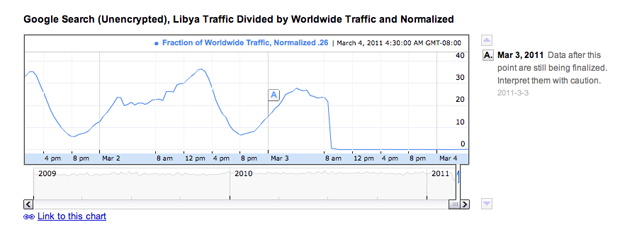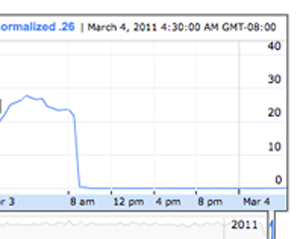
Here we go again: After a six hour shutdown about two weeks ago, traffic monitors are once again reporting that Libya has lost internet connectivity, most notably that search queries to Google from Libya have flatlined starting around a day ago.
Unlike the last time Libya went offline and the process used to shut down the connectivity in Egypt (where Internet service providers simply shut down their servers) someone has come up with a more technologically advanced way of taking the country offline this time. According to Rensys the routes in Libya are still up, but there is no data packet traffic on the still open routes as the traffic is “blackholed” right before it enters the Libyan netspace.
“It’s like a post-apocalyptic scenario where the roads are there, there just isn’t any traffic,” Rensys’ James Cowie told IBT, “Every time I think that someone has a way to shut down the internet they come up with a new way.”
From the Rensys blog:
“After a quiet week, we received reports tonight that Libyans in Tripoli were suddenly unable to use various Internet communications utilities. Examining the BGP routing table, we saw nothing unusual — all Libyan routes up and stable.
But our traceroutes tell a different story (no responses from Libyan hosts). All of the Libyan-hosted government websites we tested (i.e., the ones that are actually hosted in Libya, and not elsewhere) were unreachable.
Google’s Transparency Report seems to confirm that their Libyan query traffic has fallen to zero as well (click for latest):
The Youtube plot is interesting, suggesting that Google’s Youtube traffic from Libya has grown steadily all week. Tonight, however, we suspect that someone has turned off the tap on the Libyan Internet again, this time leaving the routes in place.”
Interestingly enough Libyan traffic to YouTube, a service popular with dissidents, had been increasing right before the shutdown according to Google. This shutdown comes ahead of planned protests in Tripoli calling for the ousting of Libyan leader Muammar Gaddafi.
Image: Google Transparency Report
